Nature’s reaction to
man’s folly
The disaster caused by climate change
Indeewara THILAKARATHNE
 The media workshop conducted by the Ministry of Environment and
Natural Resources to raise awareness on the disasters caused by climate
changes was an eye opener for man’s folly in attempting to control
nature. The media workshop conducted by the Ministry of Environment and
Natural Resources to raise awareness on the disasters caused by climate
changes was an eye opener for man’s folly in attempting to control
nature.
Minister of Environment and Natural Resources Patali Champika
Ranawaka said that entire world has to pay dearly for the plunder of
natural resources in the name of development. If no global action is
taken immediately to stop environment pollution, entire mankind is in
danger of extinction.
The man’s action and undue intervention in the harmonious and
complicated systems has caused climate change resulting in natural
disasters of unprecedented magnitude. In a presentation titled “Climate
Change and its impact on Agriculture” by Dr. B. V. R. Punyawardena,
Head, Agro-climatology in the Faculty of Agriculture at the University
of Peradeniya, it has been pointed out that increased temperature has
resulted in drastic reduction in yield.
The temperature increased especially in the areas where paddy is
grown, has caused “Ehela Pussa” in rice, a phenomena by which the
harvest is rendered useless. Increased temperature also causes increase
pet and disease occurrences, less tuber production (Potatoes, it is
observed that quality of potatoes has been reduced due to increase in
temperature), low quality yield, reduction sugar translocation to fruits
resulting in less sweet fruits.
For instance, reduced sweetness of tomato has been observed due to
increase in temperature. Land degradation in terms of increasing soil
erosion and salinisation also occurred in addition to Cold Spell (Seethala
Bolwima in paddy) and frost damage in up country crops.
Dr. Punyawardena emphasised the fact that Sri Lankan only experiences
in formation of frost and not snow as reported in media.
 Another factor which adversely affects agriculture is change of
rainfall regime which rendered century’s old weather-infused farming
activities useless. Climate change has also caused more and more intense
rains and droughts and intense mid season dry spell. Another factor which adversely affects agriculture is change of
rainfall regime which rendered century’s old weather-infused farming
activities useless. Climate change has also caused more and more intense
rains and droughts and intense mid season dry spell.
Increased variability of rainfall has resulted, among other things,
more pets and diseases and reduced fruit settings in tree fruit crops
such as Rabutan.
According to recent findings, it has been observed that higher
carbondioxide (CO2) level leads to the reduction of plant uptake of
Nitrogen and trance elements such as Iron and Zinc resulting in crop
yields with lower nutritional value.
Dr. Punyawardena pointed out the fact that climate change has
adversely affected overall food production and all three elements of
food security namely Availability, Accessibility and Affordability (3 As
in food security).
Additional Director Coastal Conservation Department, Anil Premaratne,
highlighted the environmental and socio-economic issues in coastal
areas.
Taking Negombo Estuary Area as a case study, he pointed out that main
issues in the Estuary are increased pressure on land and natural
resources, proliferation of water pollution, maintenance of favourable
shoreline morphology, ecosystems and natural hazards management.
He particularly stressed the fact that a segment of the population
has reclaimed the Estuary Area in the name of conservation by even
planting mangrove across the lagoon.
Establishment of inter-agency committee, training of different agency
members in coastal resource management, improved infrastructure
facilities, living conditions, rehabilitation of boat landing sites,
improvement of health and sanitary facilities and economic interventions
such as introducing alternative income sources for those who depend on
Estuary Area should be introduced as effective interventions for
addressing issues in the Negombo Estuary Area.
Dr. W. L. Sumathipala, Director National Ozone Unit and Climate
Change Division emphasised on the overall impact of global warming on
agriculture, health, water resources, human settlement (Sea level rise),
industry and infrastructure and transport.
The crust of the presentation was that man’s interventions have
created climate change and seriously disturbed the natural equilibrium
resulting in disasters of unprecedented magnitude.
Sanoja Seneviratne in her presentation pointed out how climate change
has led to natural disasters. Ensure Food Security, raising awareness,
exchange of information at regional level and use of media in
propagation of disaster-related information have been some of the
measures she advocated in the presentation. R. M. S. Bandara, Sectional
Head Landslide Studies and Services pointed out climate change affect
the land and soil.
He stress the fact that the impact of climate change on soil should
be taken into consideration when constructing buildings and human
settlements and methods that have to be employed in conserving soil.
All in all, workshop on disasters caused by climate change strike
home the fact that climate change has an adverse impact on life on
earth.
|


